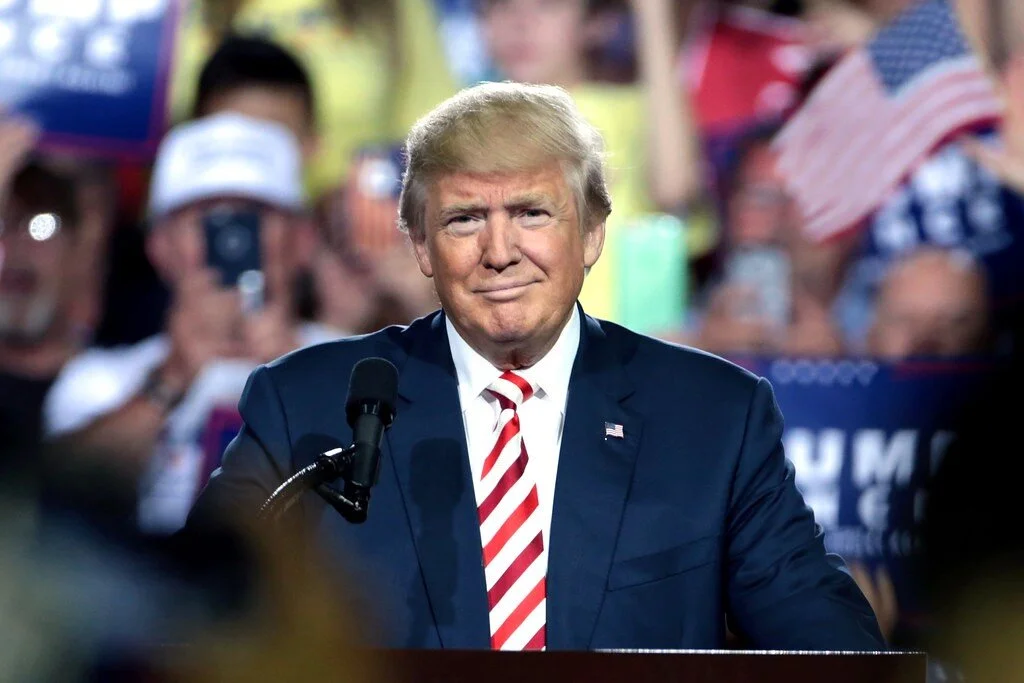Sorry folks — Trump’s crypto tweets are all about politics and nothing to do with tech.
US President Donald Trump recently set the cryptocurrency community buzzing with a series of three tweets which started out by declaring bitcoin not be real money, went on to suggest that any attempt by Facebook to launch their own cryptocurrency would require a banking charter, and finished off by reiterating the strength of ‘real money’, i.e. the US dollar.
The community was quick to focus in on different parts of this strange and seemingly unprecedented outburst. Bitcoin advocates saw positives in his mentioning of only their currency at the expense of other virtual coins, believing this a form of recognition of the superiority of bitcoin over so-called ‘altcoins’. Others pounced on his declaration of bitcoin as ‘based on thin air’ as the same old argument used against cryptocurrencies in the past, countering that the US dollar and other fiat currencies are equally based on thin air, since they are no longer backed by tangible assets such as gold.
However, it seemed clear to me that this series of tweets was not about cryptocurrency at all. With congressional midterms finished and the Democratic Party primary well under way, we are already deep into presidential election season, even though the vote itself is still sixteen months away. Viewed in this light, these tweets should be seen as a call to energise Trump’s base amongst the American electorate. Let’s take them one by one.
The real point of the first tweet was not the president’s reference to bitcoin as having no value, but rather the emphasis that cryptocurrencies can, and have been, used for illegal activity such as drug trafficking. Like with many of the president’s tweets, the factual basis for this claim is sketchy at best, but coming out against illegal activity is a great way to remind people of his credentials as the law-and-order candidate. Republicans are the party of strong policing, but the recent polling surge of Kamala Harris, the former Attorney General of California and a rare law-and-order Democrat, has created a need to reinforce this part of Trump’s credentials.
Facebook, the subject of the second tweet, is part of a growing monopoly of tech giants that have, unlike other large industries in recent decades, tended to lean towards the Democrats. Taking a swipe at this ‘liberal Silicon Valley elite’ is always good for firing up Trump’s base, and the tweets actually came at the end of a week in which he took potshots at the entire industry, threatening harsh regulations against social media providers amongst others. This was also the same week that the US Court of Appeals ruled that blocking people on Twitter should be considered a breach of the first amendment, guaranteeing free speech, setting up further conflict down the road. Additionally, reminding his supporters that Facebook would have to come crawling to him for a license before they could launch Libra, subtly reinforced his authoritarian image, something Trump has been cultivating since being elected.
The president was clearly tapping into patriotism and the ‘Make America Great Again’ spirit when he reminded everyone that the US dollar is ‘the only one real currency in the USA’ and the greatest currency in the world, in his final tweet. However, focusing on the strengths of the dollar also draws attention to the strong state of the American economy, which is likely to be the main point of debate during the presidential campaign.
Democratic Party presidential candidate, Kamala Harris, during her stint as California’s Attorney-General
To the great disappointment of crypto enthusiasts, we have to conclude that Trump’s tweets had very little to do with technology, and very much to do with the upcoming presidential election. Since 2016, the president has not done a great deal to win over people who voted for Hillary Clinton, and he has to face two large problems this time around. Firstly, presidents running for re-election can lose votes due to having passed unpopular measures while in office, as opposed to their candidates whose ideas are mere suggestions. Secondly, those voters that came out for Trump last time in order to bash ‘the establishment’ might see him as part of that very establishment after four years in office, and may be tempted to vote for a Bernie Sanders or an Elizabeth Warren should they win the Democratic nomination. With some voters lost, and few new ones coming on board, Trump has only one choice — to fire up his current base to eleven, and hope that they all come out on election day.
These tweets managed to go some way towards doing this, and at little cost. The vast majority of the American public doesn’t understand or care about bitcoin or cryptocurrency, and those that have small holdings will be unlikely to allow this issue to impact their vote, compared to issues like the economy or immigration. The hardcore cryptocurrency enthusiasts, a small group in any case, tend to be on the libertarian end of the political spectrum, and are much more likely to vote for a Gary Johnson than a Donald Trump. The president is not trying to make bitcoin great again, but rather trying to win an election.
This post was imported from my Medium, which I used for blogging between 2015 and 2019.


